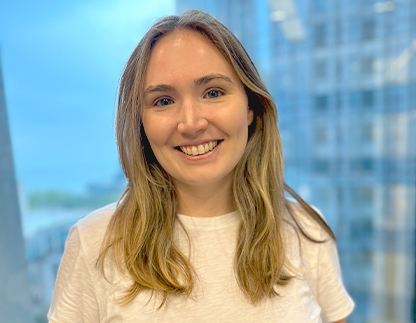It was very important for me to attend a school that had lots of opportunities to explore how I could apply my degree outside of the lab.”
Hayley McMorrow
PhD Candidate in Interdepartmental Neuroscience (NUIN)

Hayley McMorrow is a PhD candidate in the Northwestern University Interdepartmental Neuroscience (NUIN) program. She is primarily interested in how the gut and brain communicate with each other to maintain body weight. In addition to her research, Hayley currently serves on the NUIN Student Advisory Committee(NSAC) to ensure good communication between NUIN leadership and students.
How would you describe your research and/or work to a non-academic audience?
Today, one in three adults is affected by obesity and it continues to be a public health issue in the United States. However, anti-obesity drugs such as Ozempic or Wegovy offer an efficient way to treat obesity and aid weight loss. Although these GLP1 agonists are being prescribed at increasing rates, we still don't know how exactly these drugs affect the brain. My work is focused on determining the circuitry of the incretin hormones GIP and GLP1 and how they communicate along the gut-brain axis.
Tell us what inspired your research and/or work.
I really had no preference for what I wanted to work on during my PhD. What was most important to me was finding a good mentor and research that has a clinical application. Ultimately, I made my decision based on my mentor Lisa Beutler, MD, PhD. With just a five-minute pitch she was able to engross me in the work and I knew I wanted to work with her. More importantly, she has been the most amazing mentor these past four years. She's been supportive of every extra program or class I wanted to take and truly wants all of her students to succeed. She is the best!
What do you find both rewarding and challenging about your research and/or work?
I think the most challenging thing about my research is the timeline. A lot of the experiments I run can take months to collect all the data and have a large enough sample size. When you start something in March and won't be finished until June it can get very tiresome. However, when all is said in done it is rewarding to know that my work will contribute to moving the field forward. There is a lot we still don't know about the brain and how it interprets information from the gut. It's nice to know that my work is contributing to answering this question even if it is just one small aspect of it.
Why Northwestern?
Starting grad school, I knew that I didn't want to stay in academia after finishing my PhD so it was very important for me to attend a school that had lots of opportunities to explore how I could apply my degree outside of the lab. Northwestern was an obvious choice because of all the programs it has to offer. Since starting in 2019 I've had the opportunity to complete an internship with Northwestern's Innovation and New Ventures Office (INVO) and participated in the Management for Scientists and Engineers program. This year I was selected for the KIICS program where I will be learning more about the clinical impact of academic research.
How do you unwind after a long day?
Reality TV. I am obsessed with all things Bravo (RHONY, RHOBH, RHOSLC etc.).
What books are on your bedside table?
Much of my time is spent reading scientific articles in my related field. However, my most enjoyable reading happens outside of the lab. After a long day of experiments, I get to relax with the latest novel from my growing pile. My goal for the year is to read more of the classics. Each month, I read two books: one classic and one new. This month, I read The Color Purple by Alice Walker, and I am currently reading The Sympathizer by Viet Thanh Nguyen.
The Color Purple quickly became one of my favorite books. While reading, I was moved by the portrayal of the female protagonist. Despite going through years of abuse, she still had love in her heart and never came across with bitterness. I loved the themes of sisterhood and the power it gave the protagonist to overcome the hand she had been dealt. Alice Walker is an incredible writer and I highly recommend this novel to anyone I meet. Next month I plan to read The Rachel Incident by Caroline O’Donoghue and The Picture of Dorian Gray by Oscar Wilde.
What did you originally want to be when you grew up?
Growing up I wanted to be an actress. Specifically, I planned on working on Broadway. Although my goals have changed since then, I still love music. I'm actually a singer in a band made up of other grad students and friends. We are called the Notes of Ranvier (neuroscience joke).
Tell us about a current achievement or something you're working on that excites you.
Right now I am working on submitting my first first-author paper. It's exciting because it means I am close to graduating but also it's exciting to see all of my hard work from the last few years come together into a story.
Publish Date: November 14, 2023
If you know a graduate student, postdoctoral fellow, graduate faculty member, staff member, or a member of our TGS alumni population who would make a great candidate for our TGS Spotlight Series, please complete this brief TGS Spotlight Series Nomination Form.